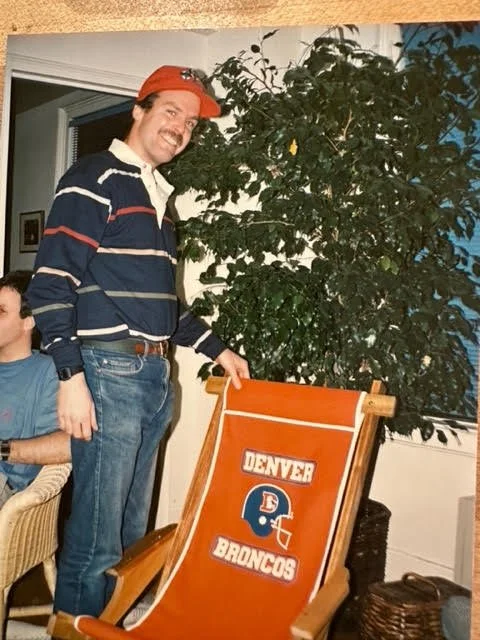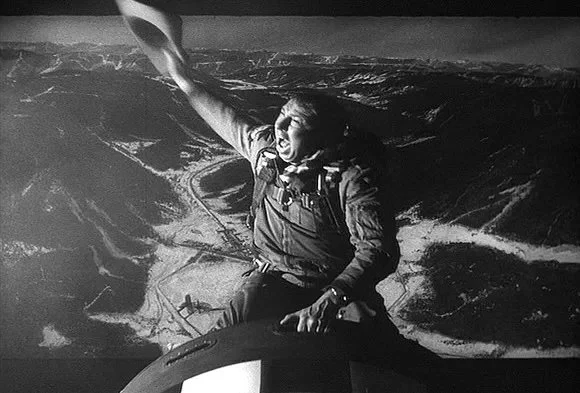Living Ironically
Here I am before the 1987 Superbowl. I sat in that chair while watching the Giants crush the Broncos. I’m also wearing a Broncos hat.
WAUWINET, AUGUST 7, 2025. In 1987 the Denver Broncos made it to the Superbowl. I’d loved the Broncos since I lived in Denver in the late 1970s, so I was very excited.
As the Superbowl approached, I bought a Broncos cap and canvas reclining chair. I wore the cap and sat in the chair while watching the game at my brother Matt’s apartment in Manhattan. Matt and others at the party rooted for the Giants.
When the Broncos scored first, I jeered the Giants fans and yelled, “Doncoooooos!” I called the Broncos “Doncos” as a term of endearment—and to acknowledge that my affection for them was ridiculous.
When the Giants went on to crush the Doncos, Matt and others jeered me, at first. Then they stopped, even Matt, because they could tell I felt bad. Their pity made me feel worse. After that game, I felt glum for weeks.
Here’s my point: I rooted for the Broncos ironically, mocking myself and the whole idea of being a sports-franchise “fan.” And yet I really cared about that stupid team. The Giants’ humiliation of the poor Doncos broke my heart.
Irony, appropriately, means different things to different people. I see irony as a kind of doubt, or ambivalence. You feel something, and at the same time you stand apart from your feeling, you contemplate it with curiosity, skepticism, amusement, as if it belongs to someone else.
If I wanted to be pretentious, I’d say that irony consists of a superposition of states, like an electron spinning clockwise and counterclockwise at the same time. You don’t give a shit, and you do. You believe in multiverses or psychoanalysis or conservation of ignorance, but not really.
Pompous pundits deplore irony, because they equate it with smirking at life, treating it like a joke. They knock irony as a pose, a life-style choice, like Hawaiian shirts (which I used to wear ironically until a girlfriend banned them).
For me, irony isn’t a choice. My ironic outlook stems from my life-long derealization, my sense that reality isn’t, you know, real, we’re all playing parts in a weird indie movie with an infinite budget. I wonder: Who’s directing this thing? And is it a comedy, tragedy, or what? But seeing things ironically need not keep you from feeling deeply.
In the early 1980s, irony helped me endure depression triggered by a bad drug trip and breakup. For almost a year I felt really shitty. At the same time, I stood back and watched my depressed self with curiosity, taking notes. Literally. Writing about my depression in a journal gave me distance from it.
I even have sex ironically. Sex is where our spiritual aspirations--our yearning for love, communion, self-transcendence, yada yada--collide with our grunting, sweating, smelly animality. Come on, if you don’t find sex comical, you’re not paying attention.
My sense of sex’s absurdity doesn’t keep me from wanting it. I go on and on about free will: I am not a number, I am a free man! Yeah, but I’m also a sack of genes programmed by natural selection to do things with females of my species. [See Addendum.]
All great art, like Rembrandt’s self-portrait, is ironic.
Conjecture: All writers, hell, all creative folk, live ironically. On the one hand, you experience bliss, misery, terror, lust, pity, rage, wonder and all that. On the other hand, you see your experiences as raw material, something to fashion into a drawing or ditty.
The artist dwells in a superposition of states: hot and cold. Take Rembrandt’s self-portrait at Manhattan’s Frick Museum, which I just visited last week. Oh, the fiery emotion in Rembrandt’s gaze! And oh, the icy precision with which he renders that emotion!
Critics denounce irony as a reaction to terrible events. One upside of 9/11, Roger Rosenblatt proclaimed shortly after that catastrophe, is that it “could spell the end of the age of irony.”
Did 9/11 end the “age of irony”? Nah.
Part of me agrees that it’s wrong to view human cruelty and suffering ironically. Our response to what Netanyahu is doing to Gazans, Putin to Ukrainians and Trump to non-white immigrants should be outrage and resistance.
But irony doesn’t preclude moral indignation any more than it precludes depression or lust. Take nuclear weapons, which I wrote about in my last column. I have always taken the prospect of nuclear annihilation very, very seriously.
But The Bomb also cracks me up. Brilliant scientists, intent on saving us, invent a gadget that can destroy us? Hilarious! When it comes to conveying nuclear horror, I prefer the savage irony of Dr. Strangelove to the earnestness of The Day After--as long as the irony doesn’t foster fatalism.
Slim Pickens, straddling a bomb, waves his cowboy hat and yells “Yeehaw” just before the world blows up in “Dr. Strangelove.”
And that brings me to a possible contradiction in my views. I’m an old-fashioned, bleeding-heart, woke liberal, who deplores war, racism and other injustices.
That’s why I loathe metaphysical systems that downplay suffering. I have in mind mystical doctrines like Platonism and pseudo-scientific conjectures like the simulation hypothesis. If ultimate reality consists of ones and zeros or groovy polygons, and consciousness is just an illusion, does our suffering really matter?
Here’s the contradiction: A 1981 drug trip left me convinced that our human drama, and the whole cosmic shebang, is the fever dream of an insane god. So where do I get off knocking the simulation hypothesis and Platonism?
Fair question, here’s my answer: I realize, rationally, that my insane-god conjecture is nuts, a projection of my derealization-haunted mind. I nonetheless cling to this wacky theology, because it helps me make sense of this wacky world.
I even suspect that god, if there is a god, observes creation ironically, with a superposed grin and grimace. Yeah, it’s irony all the way down. But that doesn’t keep me from earnestly, self-righteously espousing my woke convictions.
My views might make more sense if you squint at them ironically, so you see not contradictions but superpositions.
By the way, when John Elway and the Broncos finally won a Superbowl in 1998, I howled, “Doncooooos!!!” I felt foolish for feeling so good, but I still felt good. I rode that high for weeks.
Addendum: Someone on Twitter responded to my column by posting a link to an Onion story: “Ironic Porn Purchase Leads To Unironic Ejaculation.”
Further Reading:
I almost always write ironically, so if you want more irony check out “About Cross-Check,” which lists all the columns I’ve posted here.





